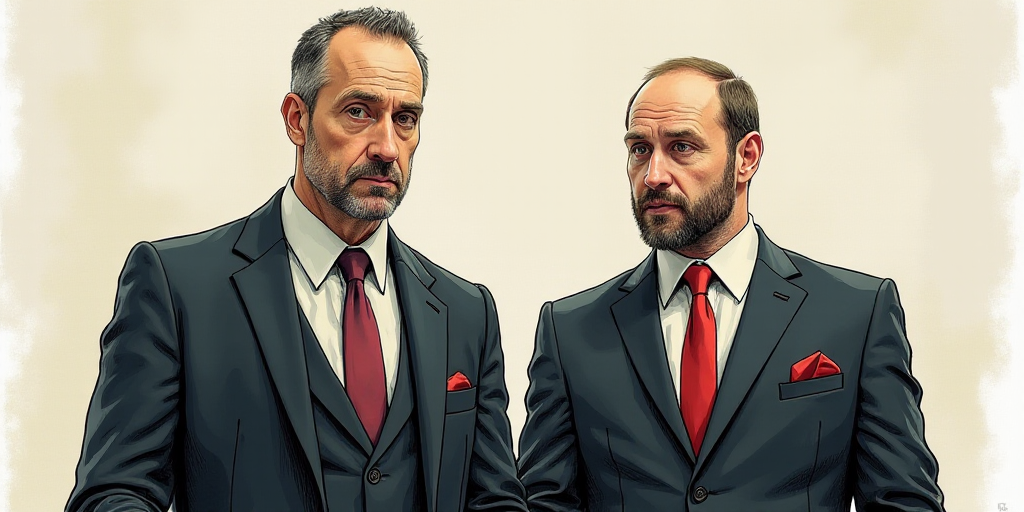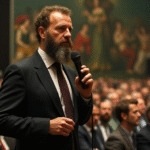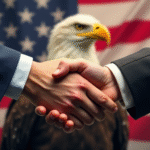Introduction
A photograph of President Donald Trump in the White House proudly displaying his collection of “MAGA” (“Make America Great Again”) caps to European leaders during urgent peace talks about Ukraine once again raised the question of what drives this peculiar man. Unlike his campaign posters and official portrait, which depict a strong man reminiscent of Winston Churchill, this image suggested a different, very American stereotype: the ostentatious businessman boasting about his wealth and showing photos of his children to strangers.
Trump’s Persona and American Stereotypes
Critics of Trump often claim that he embodies the worst aspects of American culture: vulgar ostentation, love for violence, petulant ignorance, boastfulness – “the best, the greatest, and THE MOST BEAUTIFUL SHOW ON EARTH!!!”
While there is some truth to this, Trump’s persona conceals darker forces. He lacks ideological grounding; his prejudices do not stem from firm political convictions. Ideas and beliefs are merely tools to gain power, discarded when they lose utility.
Trump’s administration shares similarities with a mafia operation. Coercing elite law firms and universities into handing over large sums to avoid trouble is a classic form of extortion. However, unlike Trump, most mobsters prefer to stay behind the scenes and avoid drawing attention. Their business is exploiting and corrupting existing institutions, not dismantling them.
The American stereotype that most closely resembles Trump is the street hustler, the “mercachifle,” the flashy suited salesman who knows how to manipulate and fleece the unwary. This is often attributed to P.T. Barnum, an entrepreneur, politician, con artist, and founder of the famous Barnum and Bailey circus of the 19th century: “A sucker is born every minute.”
The Allure of Deception and the American Dream
This perspective posits that the world is teeming with gullible losers, willing to be swindled by promises of quick money, instant fame, or a bright future. Nothing frightens the con artist more than being taken for a fool. This theme is central to Trump’s career: the notion that other countries are taking advantage of the U.S., that foreigners are laughing at Americans.
There’s a connection between this attitude and the American Dream. The fact that success, fame, and wealth remain largely out of reach for most Americans doesn’t diminish the allure of attaining them. The promise that anyone can “succeed” in America has generated considerable positive—and negative—energy. The related belief that enough money can solve any problem has fueled American optimism and deep cynicism: everyone has a price.
This spirit shuns tragedy and irony. Fatalism is for weary nations escaping a harsh world to seek fortune in America.
Cynicism, however, especially the con artist’s belief that everyone is driven by material greed, has a dangerous counterpart: naivety. Some people resist the lure of wealth and fame, not just for moral reasons but also the worst ones. After all, those who perpetrate evil often do so out of deep conviction, driven by religious or political fervor.
Trump vs. Putin: A Tale of Two Leaders
It’s possible that Russian President Vladimir Putin felt flattered by Trump’s admiration at the Alaska summit, from the red carpet and presidential limo ride to warm smiles and promises of a “great deal.” But it’s almost certain that none of this resonated with a man whose wealth surpasses Trump’s, and whose goal of reestablishing a Russian empire cannot be achieved through concessions.
Unlike Trump, Putin is historically aware. He aspires to be a great Russian leader, following in the footsteps of Joseph Stalin and Peter the Great. Putin’s vision to restore Russian grandeur is more than a slogan on a baseball cap; it’s a genuine plan to expand territory and increase influence, regardless of the cost in human lives.
Trump’s mistake is assuming he and Putin are kindred spirits, even friends. He fails to recognize that Putin is not a hustler; he’s a cunning strategist. Trump’s gullibility was exposed when, during a follow-up meeting with European leaders at the White House, an open microphone captured him whispering to French President Emmanuel Macron that Putin “wants to make a deal for me. Do you understand? No matter how crazy it sounds.” This revealed Trump as a genuine naif—a con artist believing his own lies, much like the man boasting about his MAGA caps.
Key Questions and Answers
- Q: What stereotype does Trump most closely resemble according to the article? A: The American stereotype of a flashy, ostentatious businessman who manipulates and fleeces the unwary, akin to a “mercachifle” or con artist.
- Q: How does Trump’s persona contrast with that of a typical mafioso? A: While Trump’s actions resemble extortion tactics used by mobsters, they differ in that mobsters typically avoid drawing attention and prefer exploiting existing institutions rather than dismantling them.
- Q: What is the connection between Trump’s attitude and the American Dream? A: Despite the American Dream remaining largely unattainable for most, the allure of success, fame, and wealth persists, fueled by the belief that anyone can “succeed” in America. This belief has generated both positive and negative energy, contributing to American optimism and cynicism.
- Q: How does the article describe the relationship between Trump and Putin? A: The article suggests that Trump mistakenly believes he and Putin share similar goals and personalities, failing to recognize Putin’s cunning strategic mindset. Trump’s gullibility has been exposed, making him an easy target for Putin’s manipulations.
Author: Ian Buruma is the author of numerous books, including Year Zero: A History of 1945, The Collaborators: Three Stories of Deception and Survival in World War II, and most recently, Spinoza: The Messiah of Freedom (Yale University Press, 2024).
Copyright: Project Syndicate, 1995 – 2025
www.project-syndicate.org






